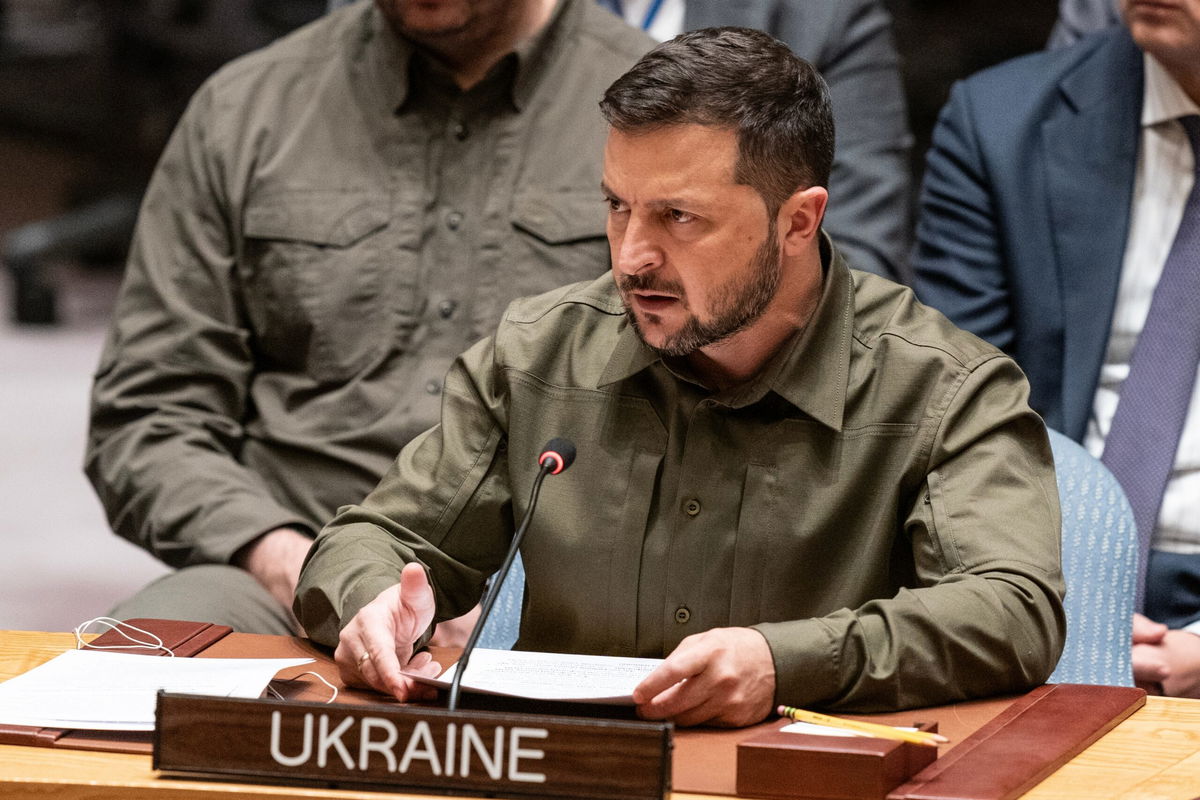President Zelenskiy acknowledged that the coming winter could be “very difficult.” Photo credit: lev radin/Shutterstock
President Volodymyr Zelenskiy has warned that Ukraine is facing one of the most difficult periods in its history. The president spoke after former US President Donald Trump called on Kiev to accept a US-backed 28-point “peace plan” within days. Ukrainian and European officials say the deal amounts to surrender. President Trump acknowledged Friday that next Thursday, U.S. Thanksgiving Day, would be an “acceptable” deadline for signing it. In a somber 10-minute speech outside the presidential palace, President Zelenskiy said Ukraine faced an impossible choice. Either protect national dignity or risk losing a key partner in the U.S. administration, which appears intent on ending the conflict on Russia’s terms.
The proposal calls for Ukraine to cede the eastern Donbas region, reduce its military, give up its long-range weapons, and abandon its membership in NATO. President Trump suggested on Fox Radio that Kiev would not be able to militarily stop Russia’s occupation of Donbas and suggested an “aggressive timeline” for a resolution.
He also reportedly threatened to cut off intelligence sharing and military assistance if Ukraine did not comply. President Zelensky insisted he would never sacrifice Ukraine’s sovereignty or violate the constitution, declaring: “We did not betray Ukraine then and we will not betray it now.”
European leaders push back
upholding sovereignty
European leaders expressed firm opposition to the plan. French President Emmanuel Macron, German Chancellor Friedrich Merz, British Prime Minister Keir Starmer and EU foreign policy chief Kaja Karas all met with Zelenskiy in a show of solidarity. The two leaders stressed that any peace agreement must respect Ukraine’s sovereignty, maintain existing territorial lines as a starting point for discussions, and protect Europe and Ukraine’s long-term interests. Karas warned that rewarding aggression would set a “very dangerous” global precedent, while Starmer stressed a “just and lasting peace” rooted in Kiev’s self-determination.
After talks with U.S. Vice President J.D. Vance, who has repeatedly pressed Ukraine to accept the deal, Zelensky expressed cautious optimism, saying negotiators were working on a path to peace that was “dignified and truly effective.” Both countries have appointed national security advisers to continue refining the draft plan.
domestic pressure mount
Zelenskiy under stress
President Zelensky acknowledged that the coming winter could be “very difficult” as Russia has already destroyed much of Ukraine’s energy infrastructure, leaving millions without heat and electricity. He also paid tribute to his people who endured “almost four years of full-scale aggression” but hinted that some compromise may be necessary to end the conflict. “Our people really want this war to end. We are strong, of course, but even the strongest metal can break,” he said.
According to insider reports, Kyiv has improved relations with the United States since February, when Trump and Vance publicly denounced Zelenskiy. But if Ukraine fails to quickly review the Russian-drafted deal, it risks provoking President Trump again. In response to recent tensions, the United States has temporarily suspended intelligence sharing and direct military assistance, although advanced weapons systems continue to be supplied under the United Nations’ Pearl Initiative.
Plan drafted without Ukraine
excluded from negotiations
The 28-point plan was drafted in Miami by Russian envoy Kirill Dmitriev and President Trump’s special representative Steve Witkoff, without cooperation from Ukraine or Europe. President Zelenskiy promised to “offer alternatives” and work calmly and constructively with Washington to ensure the protection of national interests. Ukraine’s national security adviser Rustem Umerov reportedly revised some elements but stressed that Kiev would never accept conditions that violate its sovereignty.
The Kremlin received a copy of the plan. President Vladimir Putin has signaled that he could “lay the foundations” for a final settlement, but sources noted that this falls short of Russia’s demands for NATO guarantees and constitutional neutrality. The Russian government has said that EU membership will only be considered if military elements are excluded.
Public and expert reactions
mounting criticism
The reaction within Ukraine has been overwhelmingly negative, with civil society and political commentators condemning the plan as tantamount to capitulation. The proposal has also drawn criticism from Europe. Constanze Stelzenmüller of the Brookings Institution called the draft “appalling” and “outrageous” and warned it could solidify Russia’s dominance in Europe.
The U.S. is also sending senior military officials, led by Army Secretary Dan Driscoll, to Kiev for consultations and expects to potentially travel to Moscow to further negotiate the plan. President Trump’s actions highlight the unprecedented pressure on Ukraine and raise the stakes for Zelensky’s government as domestic politics continue to come under scrutiny.
summary
- President Trump demands that Ukraine accept a 28-point U.S.-backed peace plan by Thanksgiving.
- The plan calls for ceding Donbas, reducing the military and abandoning NATO ambitions.
- President Zelensky insisted that Ukraine’s sovereignty and dignity must be protected.
- European leaders have opposed the plan, stressing a just and lasting peace in Ukraine.
- Ukraine is facing a harsh winter after its energy infrastructure was damaged by Russia.
- The plan was drafted without Ukraine. The Kremlin sees this as a partial basis.
- Ukrainian civil society and European experts have condemned the plan as a capitulation.
Impact on Kyiv
The proposal would put Zelenskiy under intense domestic and international pressure. Ukraine’s president continues to negotiate to secure a plan to maintain sovereignty and long-term security while balancing relations with the United States and European allies. The next few days are critical, as every decision has the potential to reshape the country’s course in an ongoing war in which its survival and dignity are at stake.








